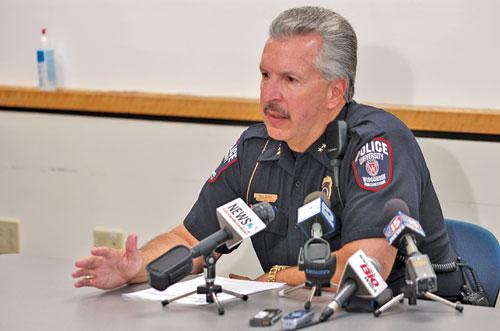The University of Wisconsin Police Department has equipped one officer with a body camera on a trial basis and plans to outfit more when a delivery of 10 more cameras arrive. Until then, UWPD is exploring privacy issues through developing a new policy.
UWPD is still drafting policy to regulate outfitting the officers with the body cameras, Marc Lovicott, UWPD spokesperson, said. The policy will include who is going to wear the cameras, when they will be worn and when they will be turned off, he said.
UWPD is exploring privacy topics that might surround the use of the cameras, Lovicott said.
“This is a relatively new idea,” Lovicott said. “There’s not a lot of departments that have a ton of experience with body camera so departments like ours have been experimenting with cameras for a little while to see how they’re useful when it comes to implementing a large number of them and coming up with a policy.”
Police officers and police departments come into contact with subjective things, for example, when they are responding to a call at a hospital where there are patients who have an expectation to a certain degree of privacy, Lovicott said.
There are times when police officers enter residence halls and have to enter student’s rooms, Lovicott said. UWPD is exploring whether they need to turn body cameras off in these situations, he said.
“Privacy issues are definitely something that we’re concerned about and we feel are important,” Lovicott said. “We have to balance what’s reasonable and what’s not.”
The trial run for body cameras is primarily being used to check in with the officers to evaluate their experience, Lovicott said. UWPD has been rotating through different officers to see what different experiences they have, he said.
In the future there will be situations where the camera footage will be used as evidence, Lovicott said.
“A lot of time the camera is there to make sure we’re doing a good job,” Lovicott said. “If there’s ever a question about the job that we’re doing, we can refer to that footage to make sure we’re doing our job accurately and the best we possibly can, or we can make adjustments to make sure we’re doing the best we can.”
It is no longer a question of if body cameras are going to be used, but rather when, Joel DeSpain, MPD spokesperson, said. He agreed that there were many concerns surrounding privacy.
DeSpain said people may be less willing to talk to officers if they are wearing body cameras.
“We use body cameras in neighborhoods where people who may not have citizenship and proper documentation won’t be willing to speak to us if they know they’re being filmed,” DeSpain said. “There are also people who provide information on the condition they stay anonymous.”
UWPD has ordered the cameras with grant money but there is no set date for their arrival, Lovicott said.


